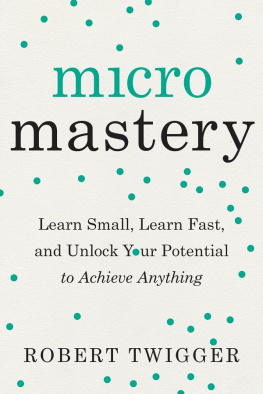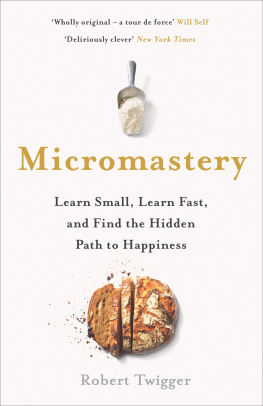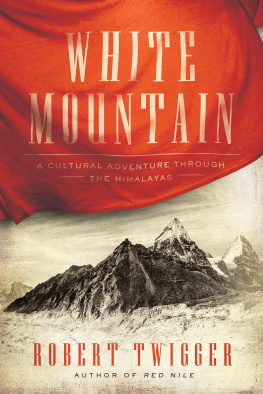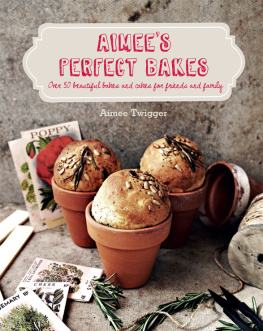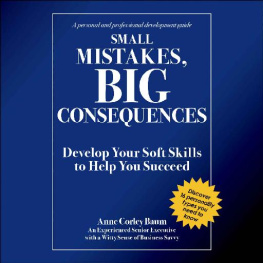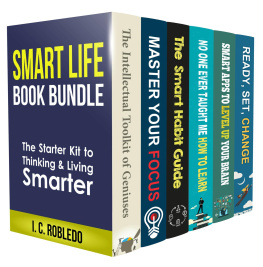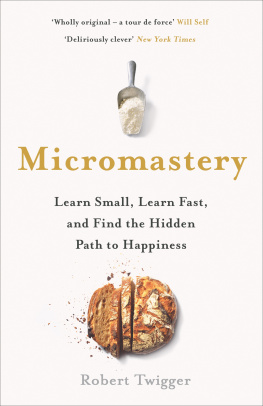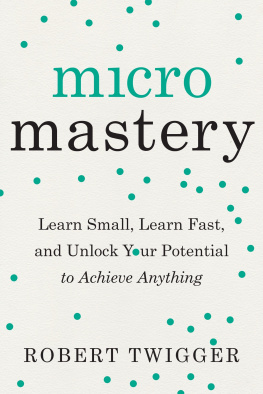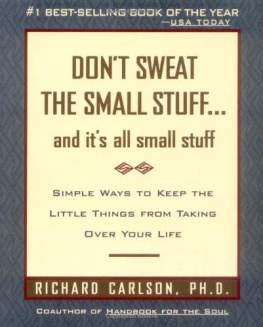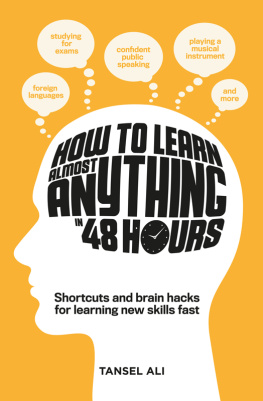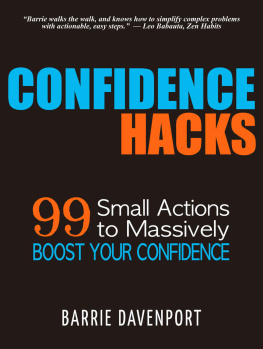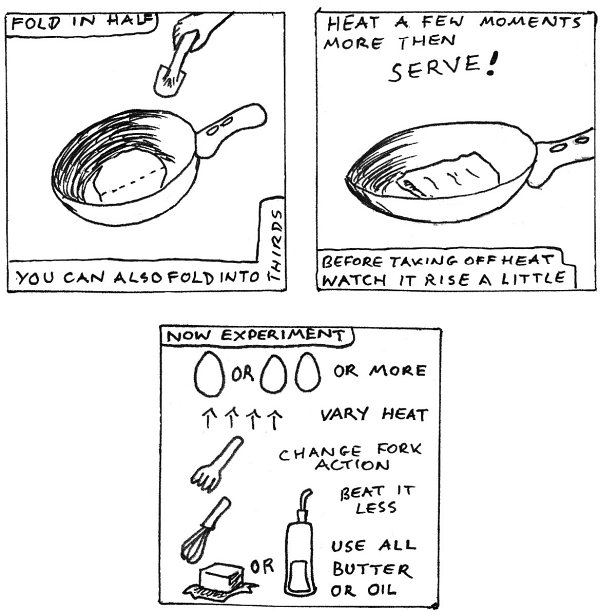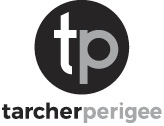
An imprint of Penguin Random House LLC
375 Hudson Street
New York, New York 10014
First published in Great Britain by Penguin Life, an imprint of Penguin Random House UK 2017
Copyright 2017 by Robert Twigger
Penguin supports copyright. Copyright fuels creativity, encourages diverse voices, promotes free speech, and creates a vibrant culture. Thank you for buying an authorized edition of this book and for complying with copyright laws by not reproducing, scanning, or distributing any part of it in any form without permission. You are supporting writers and allowing Penguin to continue to publish books for every reader.
Drawings and photographs by the author
TarcherPerigee with tp colophon is a registered trademark of Penguin Random House LLC.
Library of Congress Cataloging-in-Publication Data
Names: Twigger, Robert, 1964 author.
Title: Micromastery : learn small, learn fast, and unlock your potential to
achieve anything / Robert Twigger.
Description: New York, New York : TarcherPerigee, 2018. | Originally
published: London : Penguin Life, 2017.
Identifiers: LCCN 2017039317 (print) | LCCN 2017056050 (ebook) | ISBN 9780525504306 (ebook) | ISBN 9780143132325 (paperback)
Subjects: LCSH: Cognitive psychology. | Ability. | Expertise. | BISAC: PSYCHOLOGY / Cognitive Psychology. | SELF-HELP / Personal Growth / Success. | SELF-HELP / Personal Growth / Happiness.
Classification: LCC BF201 (ebook) | LCC BF201 .T85 2018 (print) | DDC 153.1/52dc23
LC record available at https://lccn.loc.gov/2017039317
Accordingly nothing in this book is intended as an express or implied warranty of the suitability or fitness of any product, service, or design. The reader wishing to use a product, service, or design discussed in this book should first consult a specialist or professional to ensure suitability and fitness for the readers particular life-style and environmental needs.
Version_1
The memory of Rabia Basri 714801
The creative scientist needs an artistic imagination.
Max Planck, 1918 winner of the Nobel Prize in Physics
Contents
Micromastery
What is Micromastery?
Start with the egg, not the chicken
YouTube has clips of The Great Egg Race, a long-running TV show in the 1980s, hosted by an amiable German-born egghead called Dr. Heinz Wolff. Like a forerunner and more inventive version of Scrapheap Challenge, contestants had to build a gadget with limited resources to meet the challenge set out at the start of the show. In the early series all the tasks involved an egg that mustnt be broken, the first task being to make a machine to transport an egg the farthest distance possible using only paper clips, card, and rubber bands. It was such a simple idea, yet it gave rise to incredibly inventive machines. And it all started with an egg, something rather small and humble.
Life can be overwhelming. We want to do as much as we can, see the world, learn new thingsand it can all get a bit too much. I reached a point in my life when I felt that I could no longer be interested in everything. I had to shut some of life out, and I didnt like that. I was living under the assumptionthe false assumption, as it turned outthat to know anything worthwhile took years of study, so I might as well forget it.
But something inside me rebelled. I still wanted to learn new things and make new things. They didnt have to be big thingsI was happy to leave that till later. Start small, start humble.
Start with an egg.
So I was thinking about how long it would take to learn how to cook really well. I recalled a chef telling me that the real test is doing something simplelike making a perfect omelet. Everything you know about cooking comes out in this simple dish. So I decided to switch the order around. Instead of spending 10,000 hours learning the basics of cookery and then showing my expertise in omelet making, Id start with just making an omelet.
I really focused on making that omelet. I separated it from the basic need that cooking usually fulfillsfilling my stomachso that it now occupied a special, singular place in my life. It had become a micromastery.
A micromastery is a self-contained unit of doing, complete in itself but connected to a greater field. You can perfect that single thing or move on to bigger thingsor you can do both. A micromastery is repeatable and has a success payoff. It is pleasing in and of itself. You can experiment with the micromastery because it has a certain elasticityyou can bend it and stretch it, and as you do you learn in a three-dimensional way that appeals to the multisensory neurons in our brain.
Its the way we learn as kids. You never absorb all the fundamentals straight awayyou learn one cool thing, then another. You learn a 360 on a skateboard or how to make a crystal radio. My father was a teacher, and he hoped to encourage me when he told me that he would buy me the parts to make a transistor radio when I could explain how a transistor worked. My interest died immediately. I knew how to make the radio and have fun with it, but having to explain it was something difficult, adult, and alien. And wrong. (Dad, I forgive you.)
Hungarian psychologist Mihaly Csikszentmihalyi has written extensively A micromastery, because it is repeatable without being repetitious, has all the elements that allow us to enter a flow state, which produces great contentment and enhances physical and mental health.
Learning a micromastery doesnt commit you in that deadening way that buying a beginners textbook does. By its limited nature, it gives you permission to remain interested in the world. It doesnt mean you have to commit to doing that thing for what feels like forever, and at the same time it spares you any worries that youve wasted your time.
Do you know the feeling of doing an introductory course on something, which you give up on, and then a few years later you try to tell others what you learned, but you cant remember? A micromastery isnt like that. Its with you foreverand its nice to have something to show others. For instance if you learn a martial art you need something to shut people up with when they say, Go on, show us a move.
A micromastery has a structure that connects in a crucial way to important elements in the greater field it is a part of. It reveals relationships and balances in the elements of the task that mere words and explanation, textbook-style, cannot. Its repeatability and gameabilitypeople like that omelet, ask for another, you start to aim higherturn it into a self-teaching mechanism, where experimentation within certain defined limits greatly increases your learning.
But lets get back to starting with an eggor two.
A chef gave me the tip about using the fork to bulk up the omelet. I kept practicing. I went online and found more tips. Then a French woman told me about separating the yolk from the white, which allows your omelet to double in thickness and softness. When its served, people simply go: Wow!

